Презентация mkairjak.FML.Regulatory Framework of Securities Markets in the EU 02 11 15

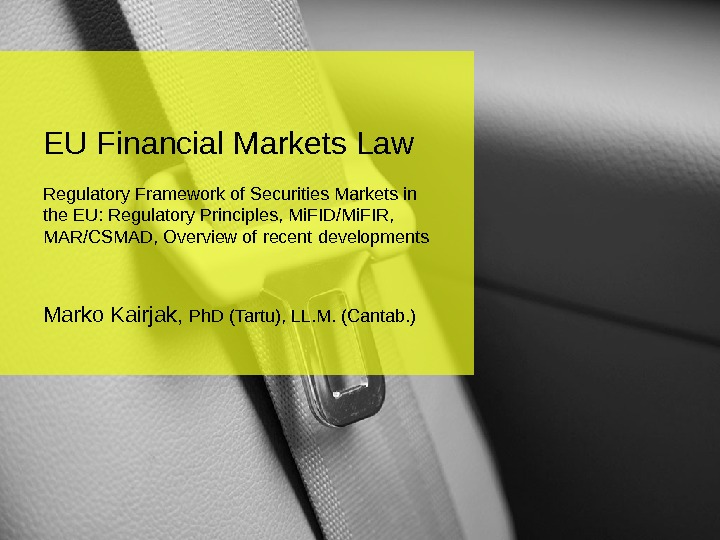

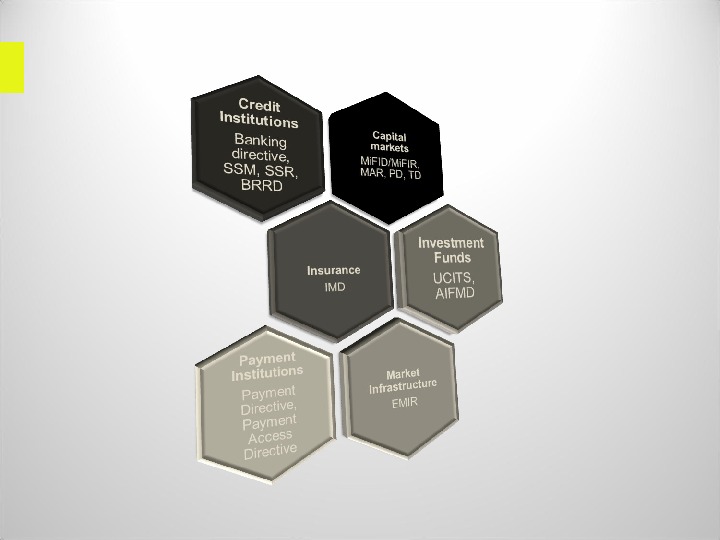
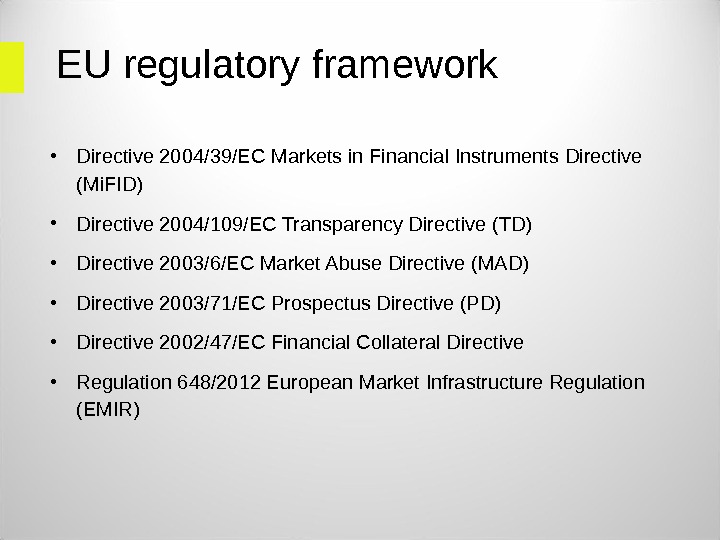
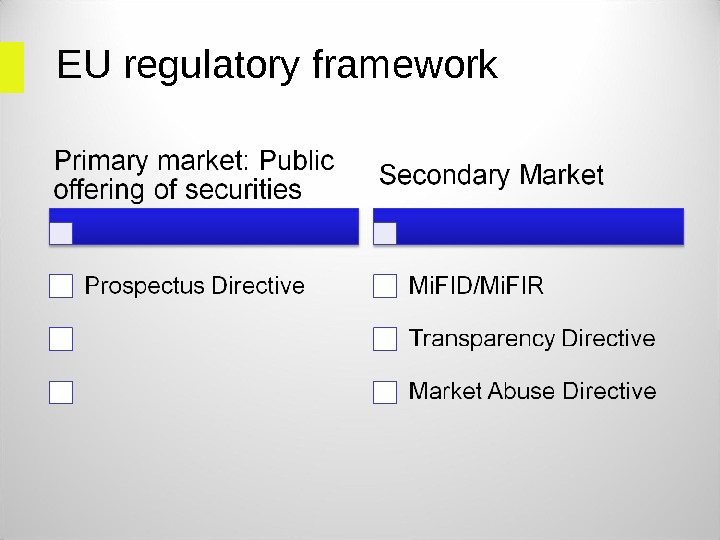

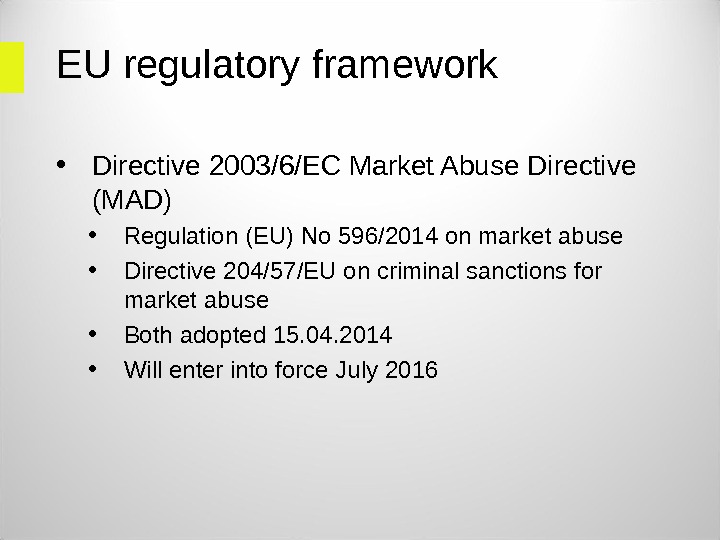
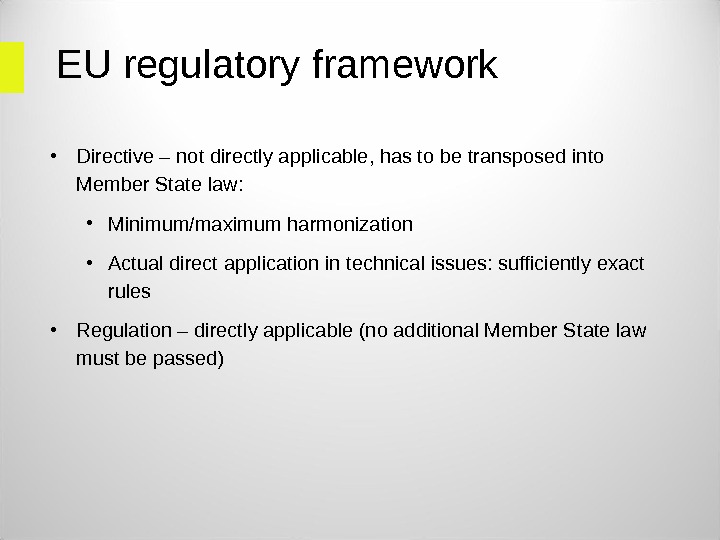

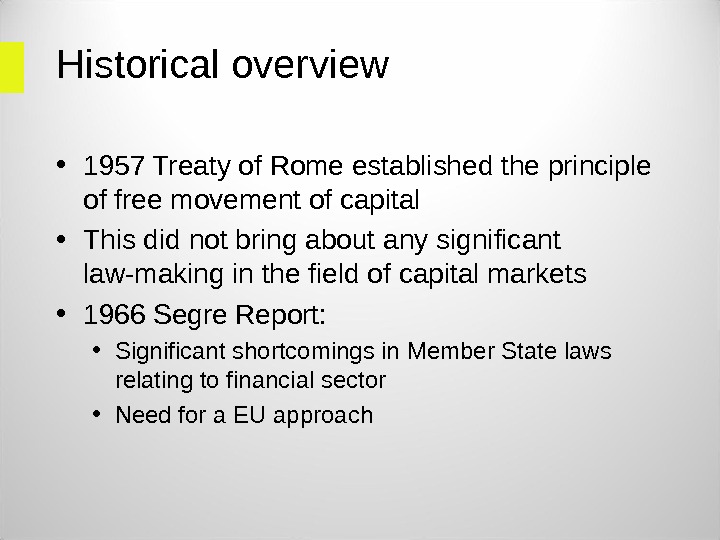


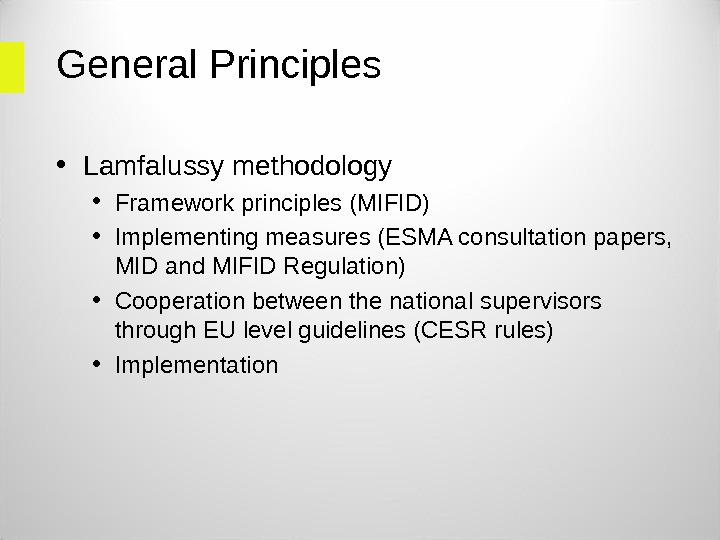

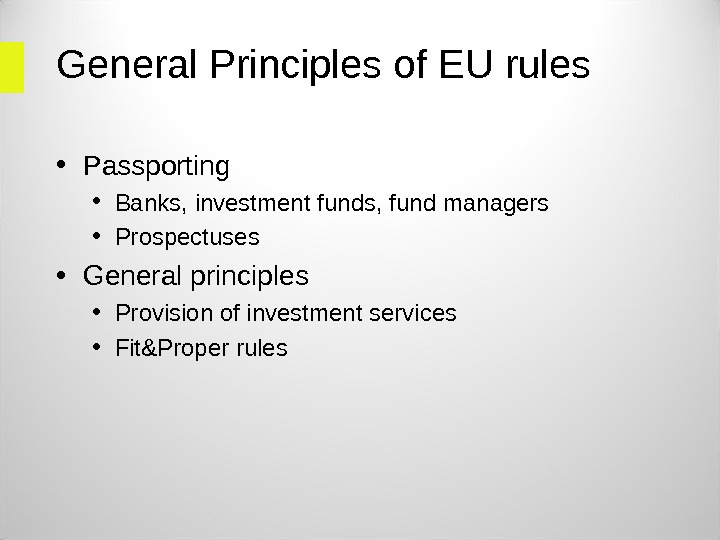
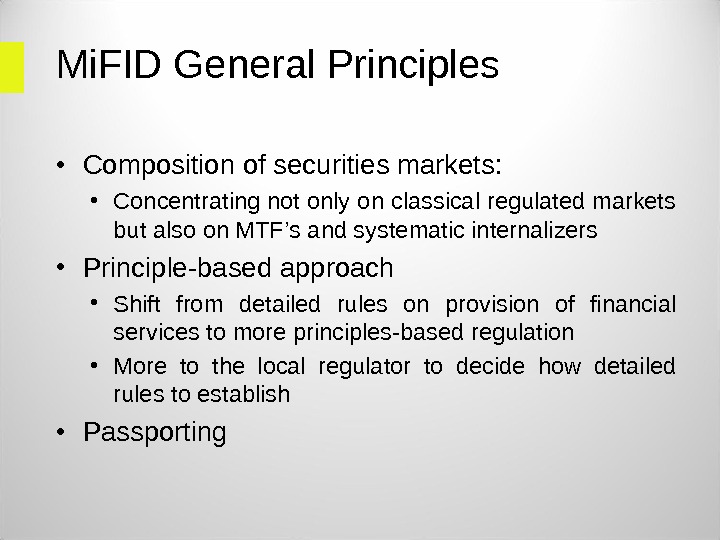
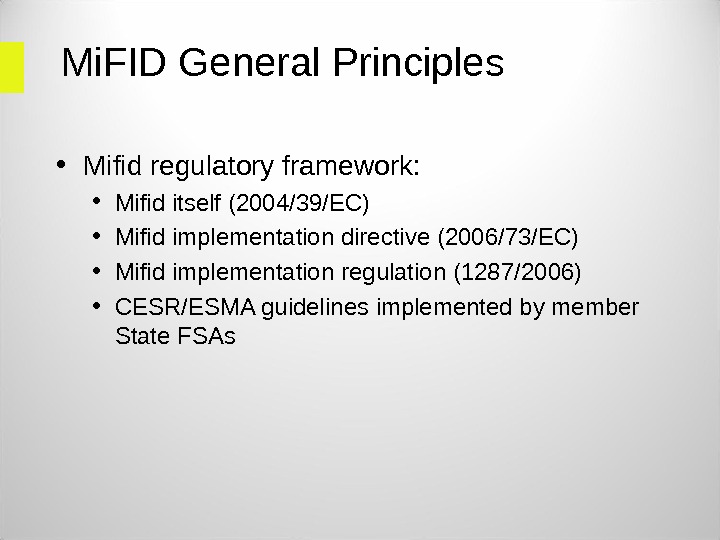
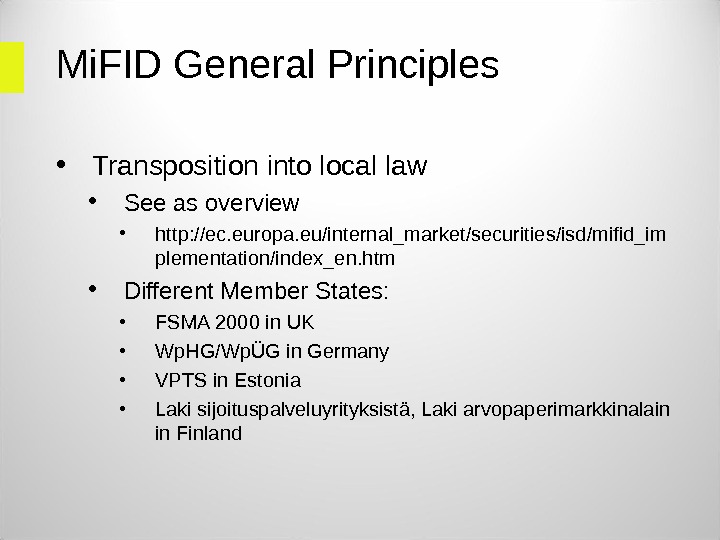
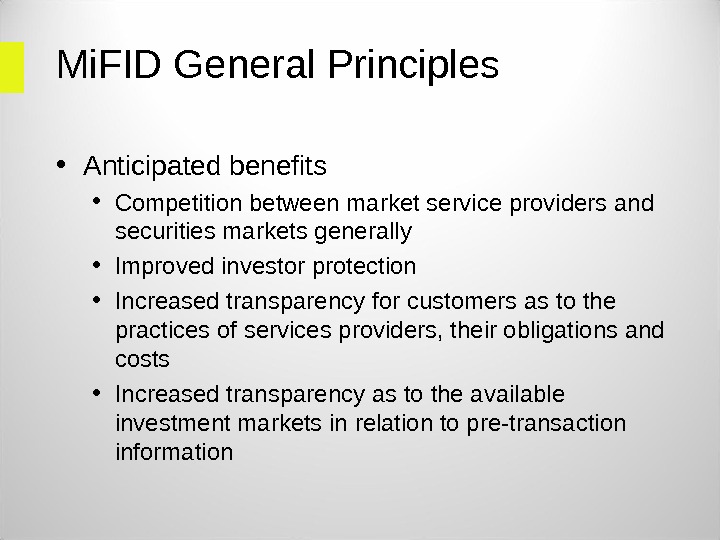
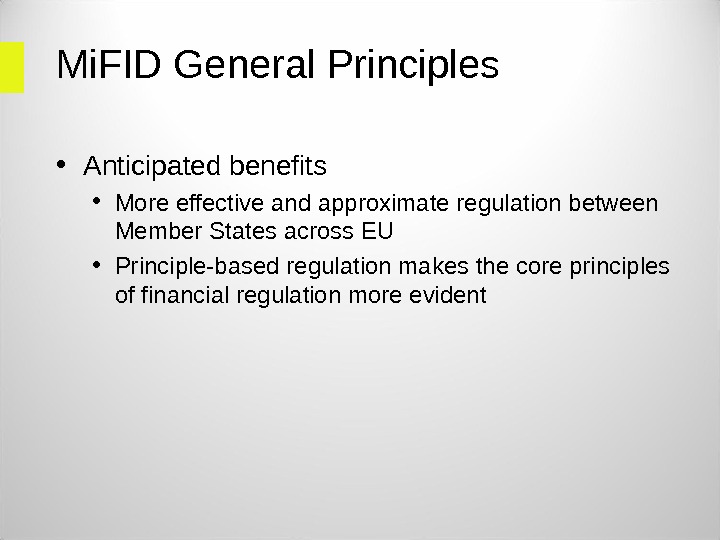
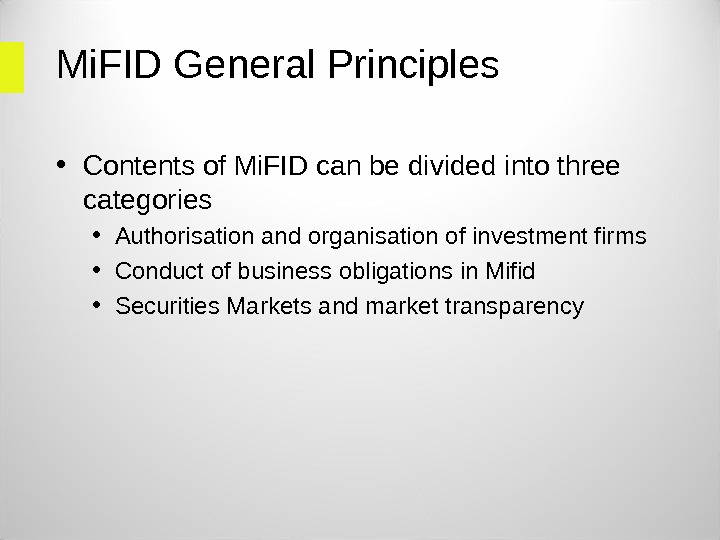
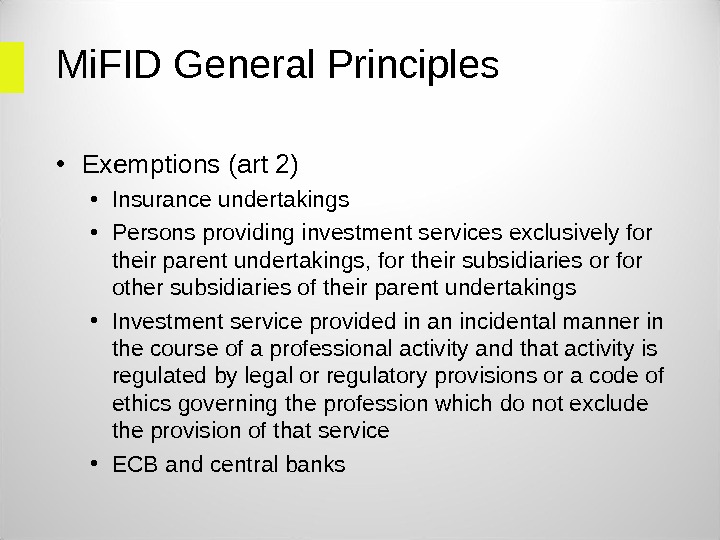
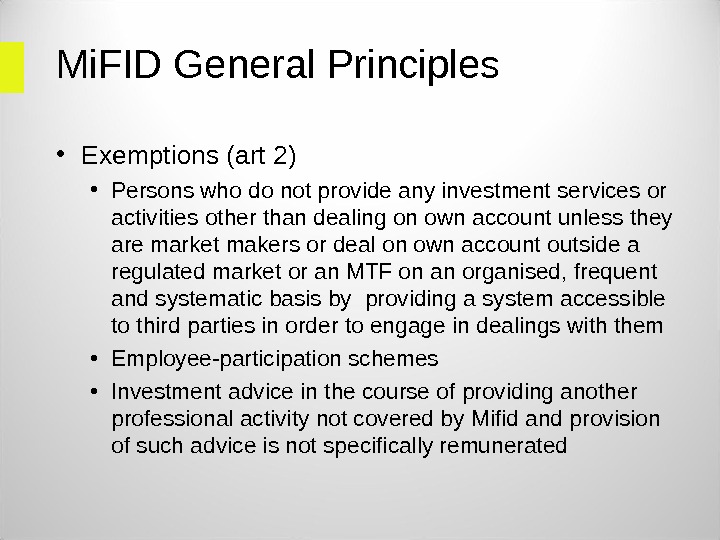
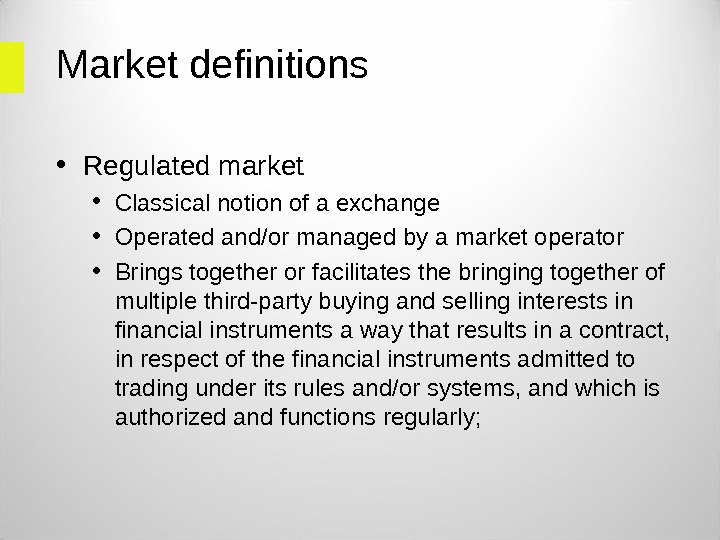
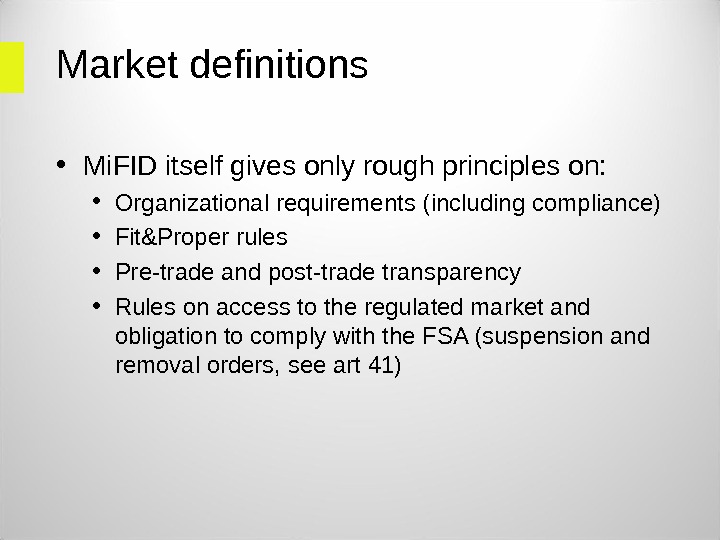
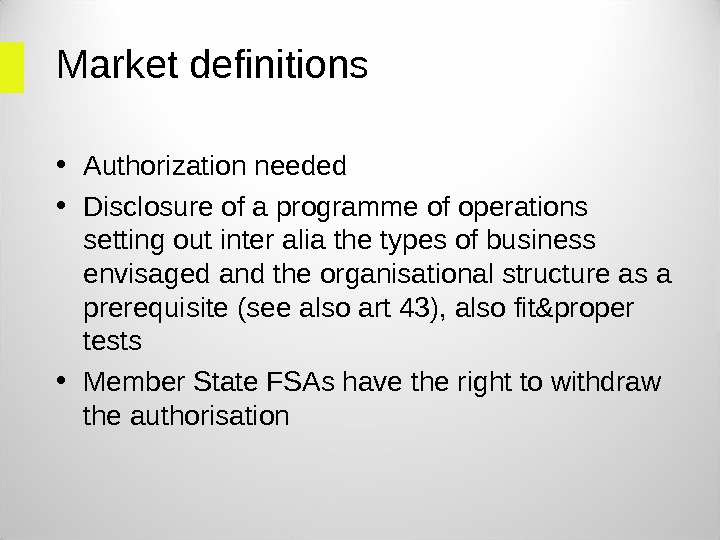
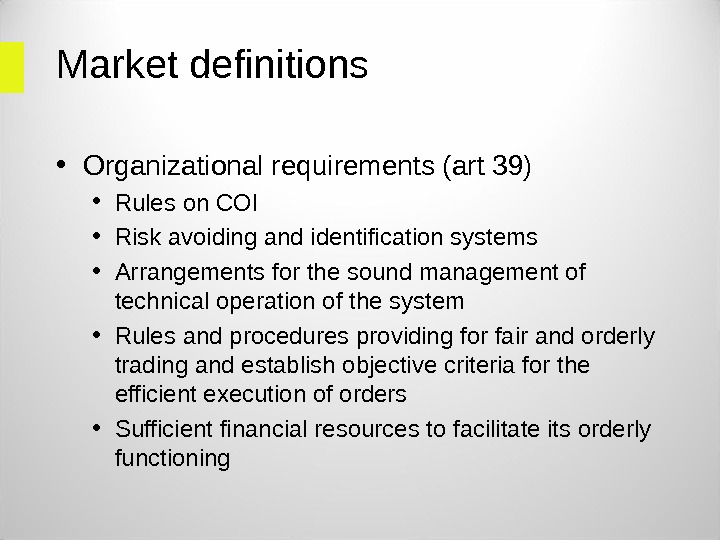

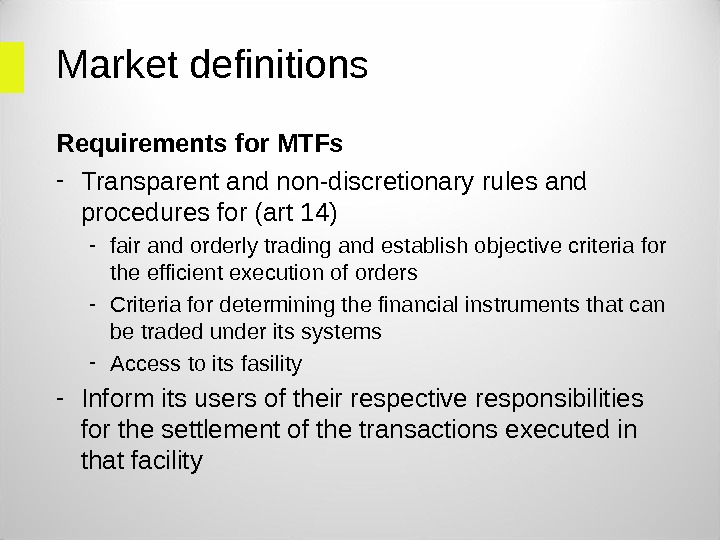
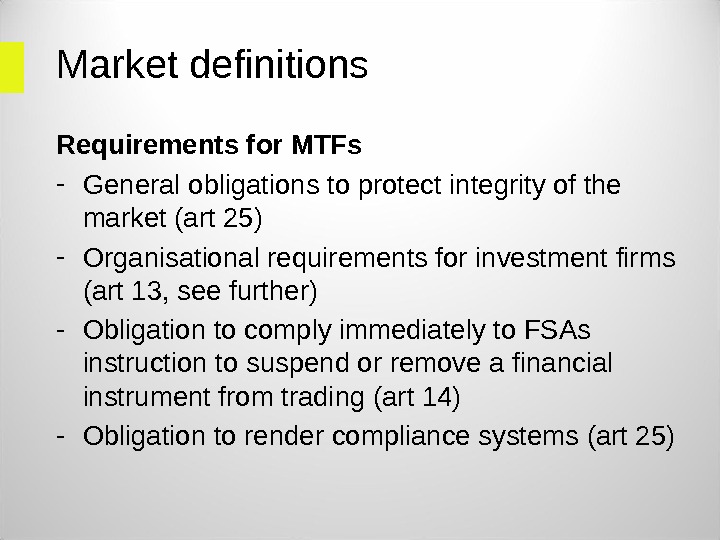
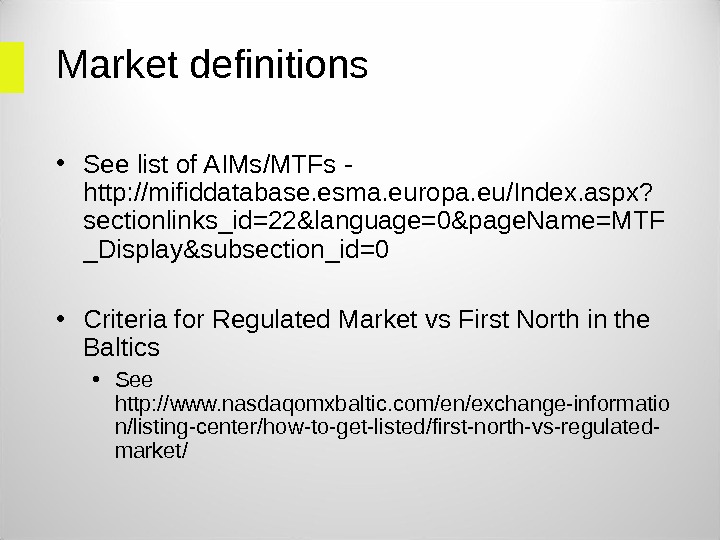
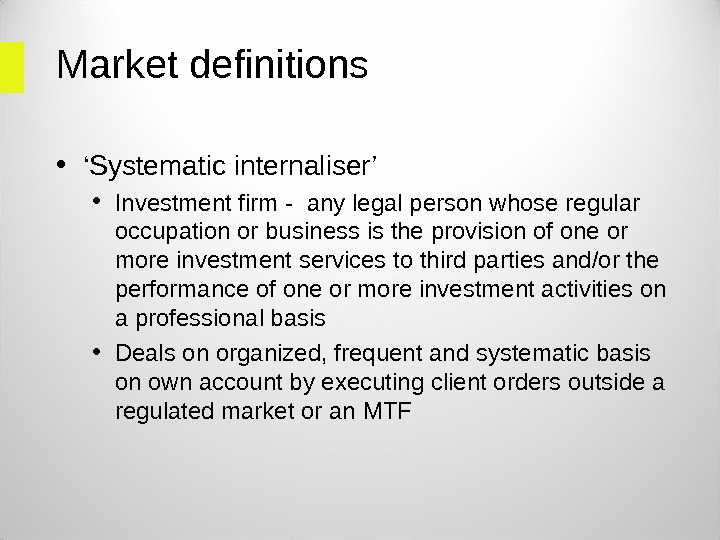
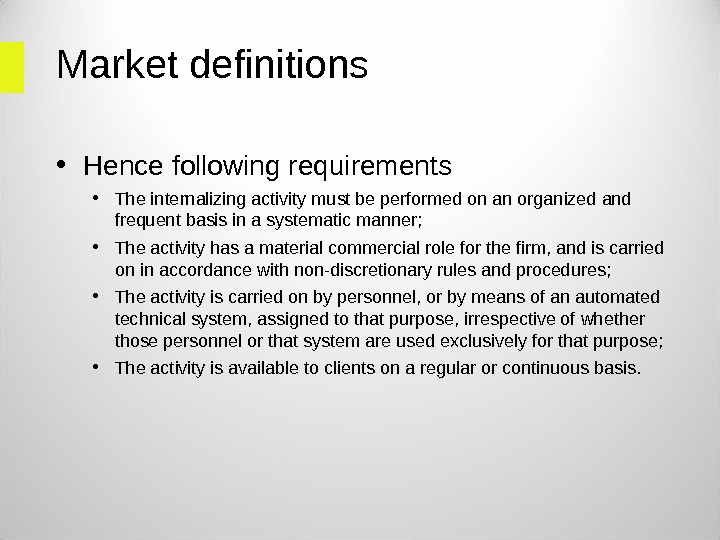
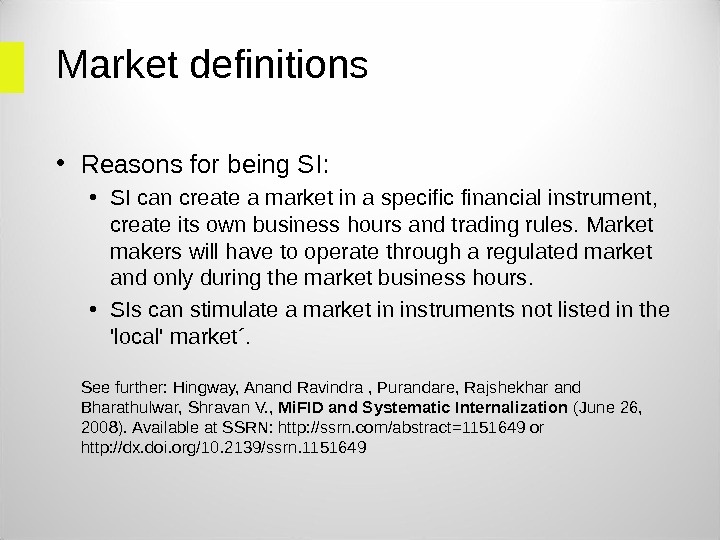
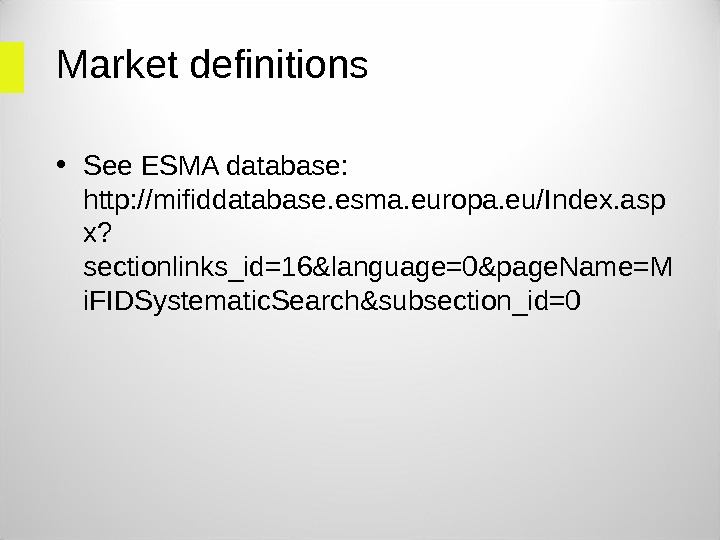
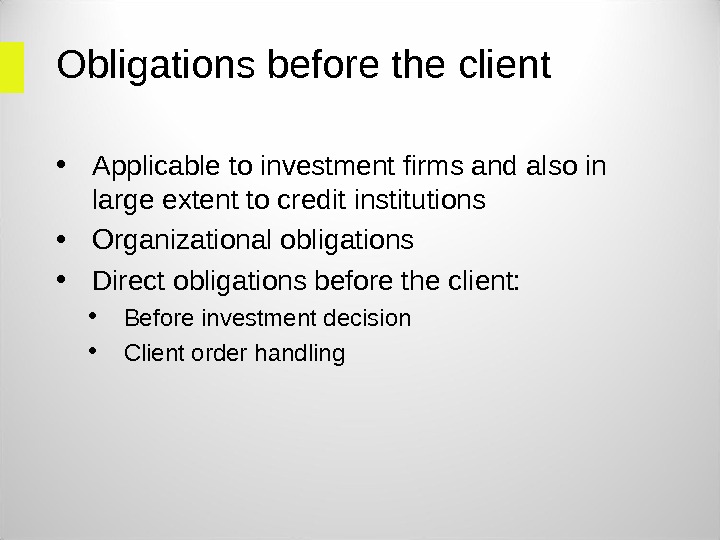
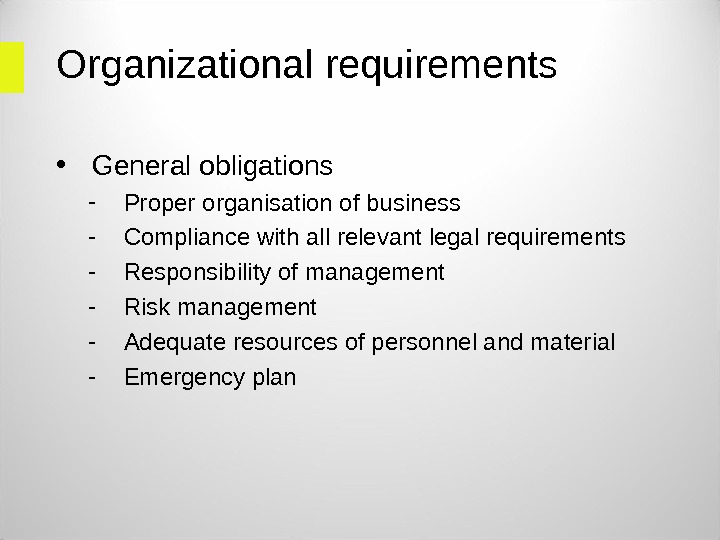
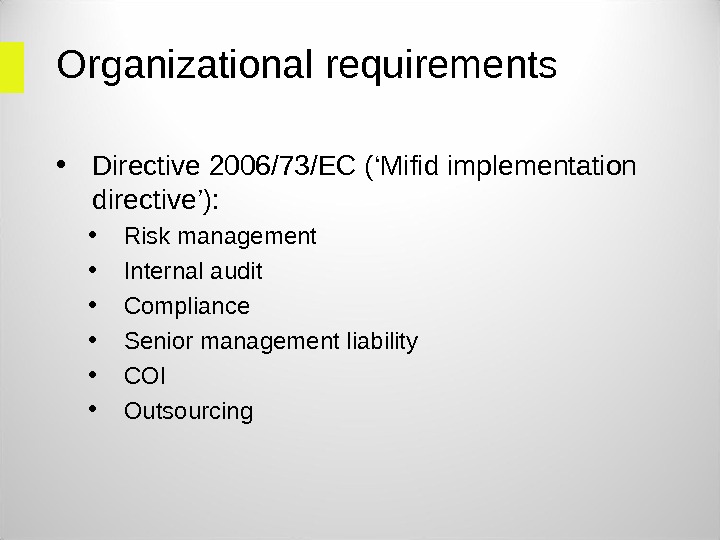
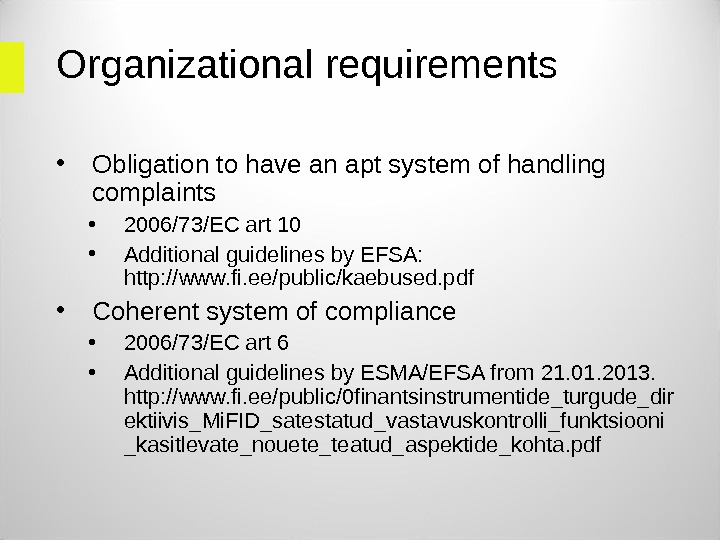
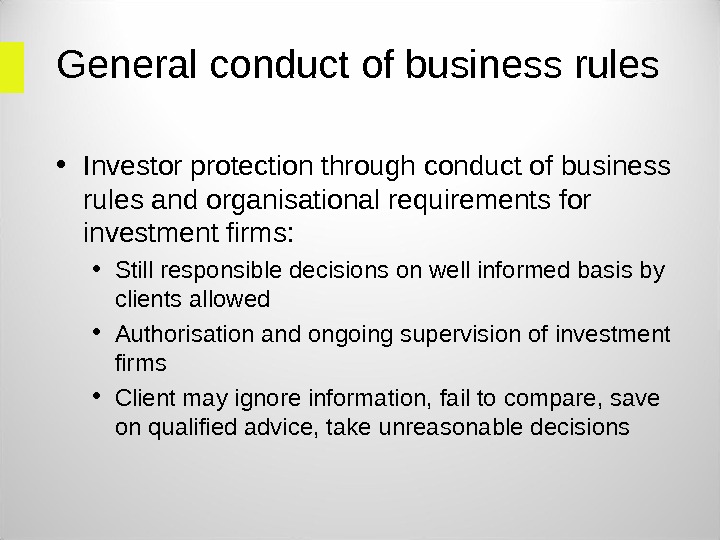

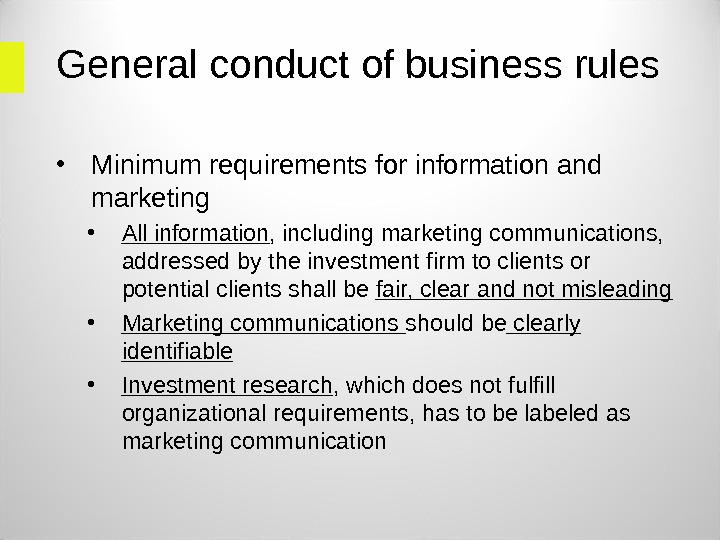
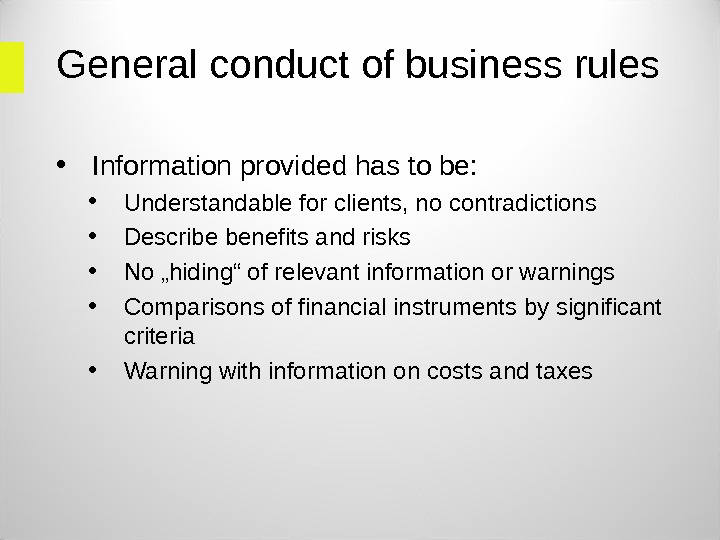
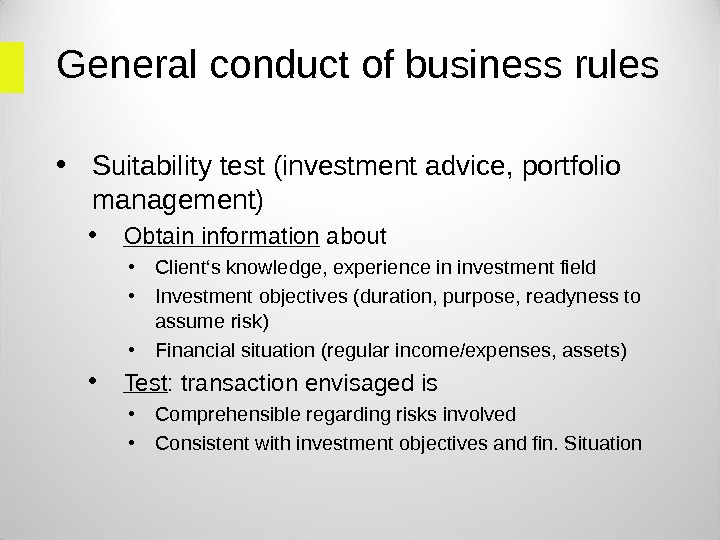

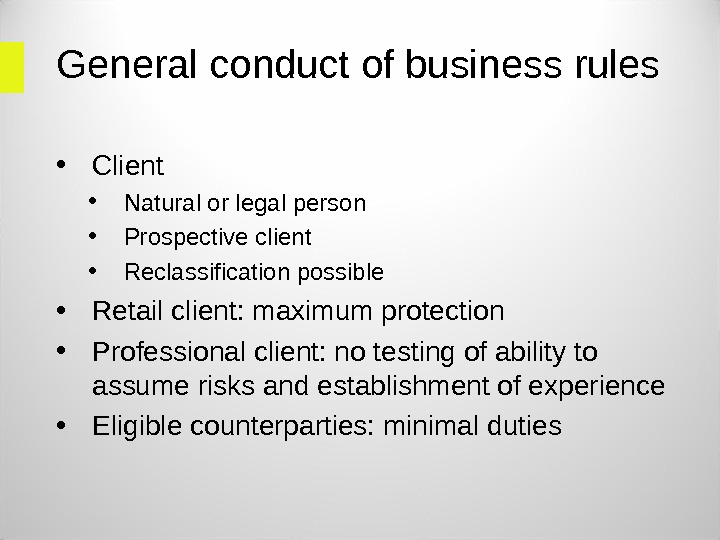

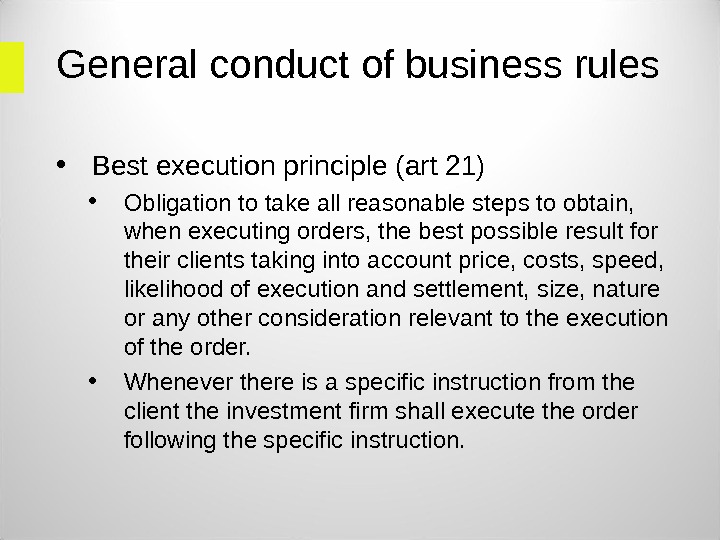
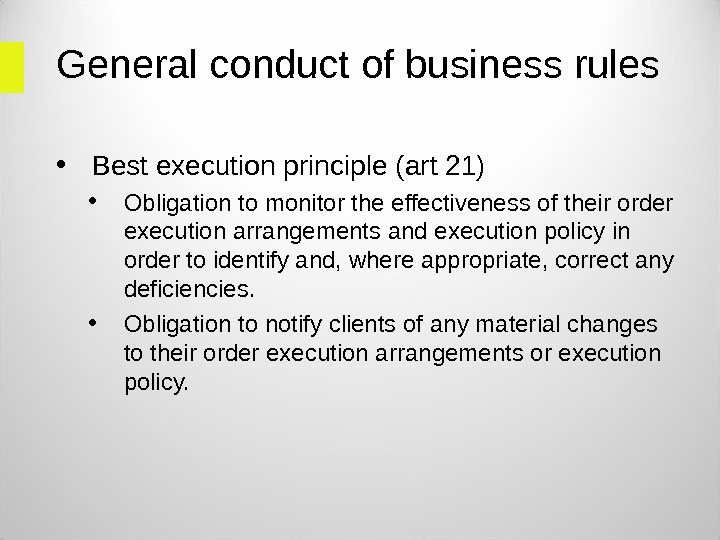
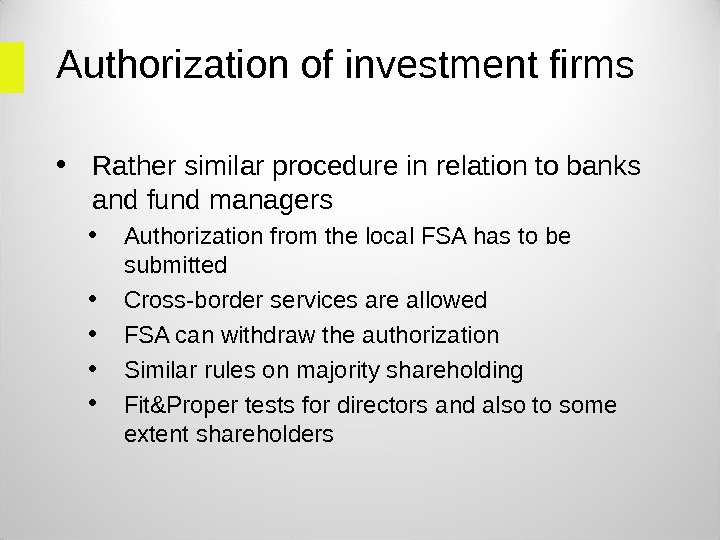
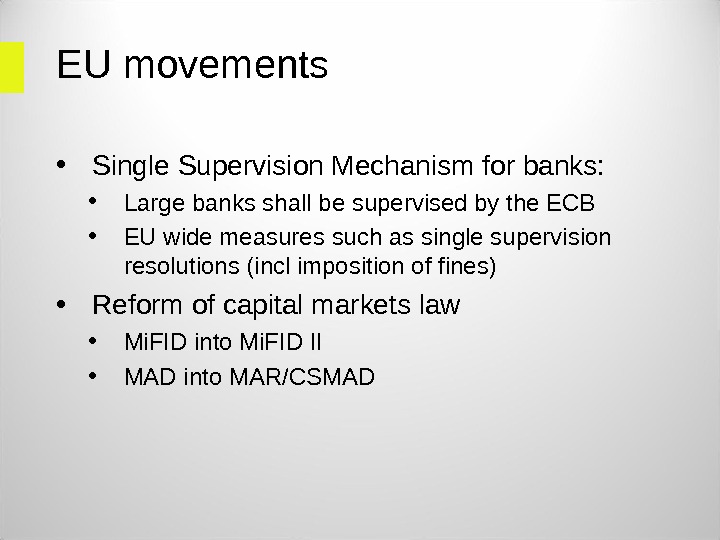
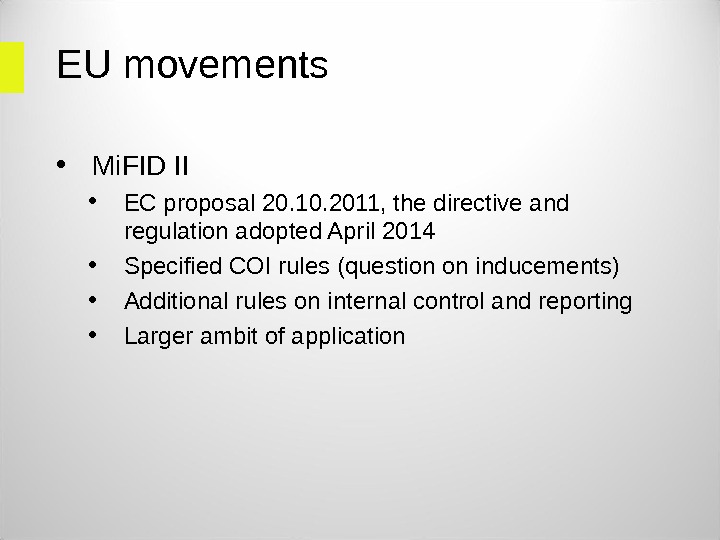
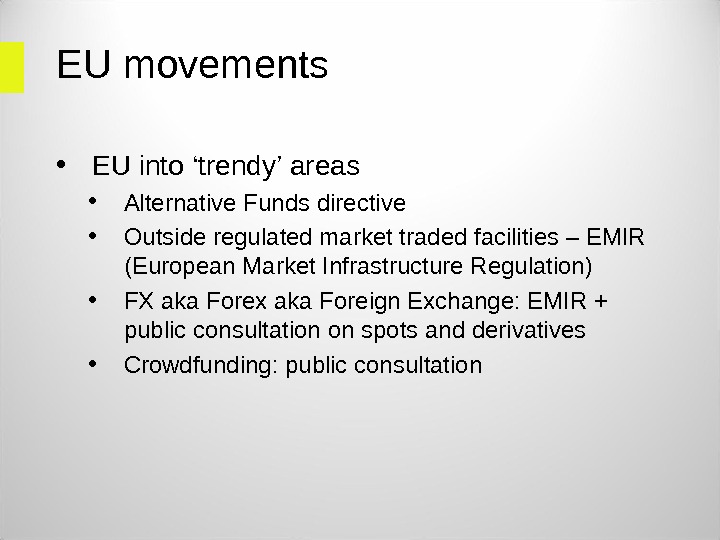

mkairjak.fml.regulatory_framework_of_securities_markets_in_the_eu_02_11_15.ppt
- Размер: 699 Кб
- Количество слайдов: 54
Описание презентации Презентация mkairjak.FML.Regulatory Framework of Securities Markets in the EU 02 11 15 по слайдам
 EU Financial Markets Law Regulatory Framework of Securities Markets in the EU: Regulatory Principles, Mi. FID/Mi. FIR, MAR/CSMAD, Overview of recent developments Marko Kairjak, Ph. D (Tartu), LL. M. (Cantab. )
EU Financial Markets Law Regulatory Framework of Securities Markets in the EU: Regulatory Principles, Mi. FID/Mi. FIR, MAR/CSMAD, Overview of recent developments Marko Kairjak, Ph. D (Tartu), LL. M. (Cantab. )
 Lecture timetable 1. Regulatory Framework of Securities Markets in the EU: Regulatory Principles, Mi. FID/Mi. FIR, MAR/CSMAD, Overview of recent developments 2. Regulatory Framework of Securities Markets Primary Market: Definition of Securities, Registration, Public Offer of Securities, Prospectus , Crowdfunding 3. Regulatory Framework for Securities Secondary Market: Post-listing disclosure, Market Abuse, Anti-Money Laundering 4. Discussion class 1 5. Regulatory framework for Investment Services: client classification and provision of services, differentiation between investment services and ancillary investment services, Investment service providers (conduct of business rules), Tests before providing investment services, PRIPS 6. Regulatory Framework for Investment Funds: Structure of fund management, Types, rules and peculiarities of different investment funds, alternative fund rules (AIFMD) 7. Discussion class
Lecture timetable 1. Regulatory Framework of Securities Markets in the EU: Regulatory Principles, Mi. FID/Mi. FIR, MAR/CSMAD, Overview of recent developments 2. Regulatory Framework of Securities Markets Primary Market: Definition of Securities, Registration, Public Offer of Securities, Prospectus , Crowdfunding 3. Regulatory Framework for Securities Secondary Market: Post-listing disclosure, Market Abuse, Anti-Money Laundering 4. Discussion class 1 5. Regulatory framework for Investment Services: client classification and provision of services, differentiation between investment services and ancillary investment services, Investment service providers (conduct of business rules), Tests before providing investment services, PRIPS 6. Regulatory Framework for Investment Funds: Structure of fund management, Types, rules and peculiarities of different investment funds, alternative fund rules (AIFMD) 7. Discussion class

 EU regulatory framework • Directive 2004/39/EC Markets in Financial Instruments Directive (Mi. FID) • Directive 2004/109/EC Transparency Directive (TD) • Directive 2003/6/EC Market Abuse Directive (MAD) • Directive 2003/71/EC Prospectus Directive (PD) • Directive 2002/47/EC Financial Collateral Directive • Regulation 648/2012 European Market Infrastructure Regulation (EMIR)
EU regulatory framework • Directive 2004/39/EC Markets in Financial Instruments Directive (Mi. FID) • Directive 2004/109/EC Transparency Directive (TD) • Directive 2003/6/EC Market Abuse Directive (MAD) • Directive 2003/71/EC Prospectus Directive (PD) • Directive 2002/47/EC Financial Collateral Directive • Regulation 648/2012 European Market Infrastructure Regulation (EMIR)
 EU regulatory framework
EU regulatory framework
 EU regulatory framework • Directive 2004/39/EC Markets in Financial Instruments Directive (Mi. FID): • Directive 2014/65/EU on markets in financial instruments • Regulation (EU) No 600/2014 on markets in financial instruments • Both adopted 15. 04. 2014, Member State must adopt rules by 27. 01.
EU regulatory framework • Directive 2004/39/EC Markets in Financial Instruments Directive (Mi. FID): • Directive 2014/65/EU on markets in financial instruments • Regulation (EU) No 600/2014 on markets in financial instruments • Both adopted 15. 04. 2014, Member State must adopt rules by 27. 01.
 EU regulatory framework • Directive 2003/6/EC Market Abuse Directive (MAD) • Regulation (EU) No 596/2014 on market abuse • Directive 204/57/EU on criminal sanctions for market abuse • Both adopted 15. 04. 2014 • Will enter into force July
EU regulatory framework • Directive 2003/6/EC Market Abuse Directive (MAD) • Regulation (EU) No 596/2014 on market abuse • Directive 204/57/EU on criminal sanctions for market abuse • Both adopted 15. 04. 2014 • Will enter into force July
 EU regulatory framework • Directive – not directly applicable, has to be transposed into Member State law: • Minimum/maximum harmonization • Actual direct application in technical issues: sufficiently exact rules • Regulation – directly applicable (no additional Member State law must be passed)
EU regulatory framework • Directive – not directly applicable, has to be transposed into Member State law: • Minimum/maximum harmonization • Actual direct application in technical issues: sufficiently exact rules • Regulation – directly applicable (no additional Member State law must be passed)
 EU Regulatory framework • Tenents of EU law • Establishment of an internal market • Free movement of capital • Capital markets not exclusive competence, interference subject to principle of subsidiarity
EU Regulatory framework • Tenents of EU law • Establishment of an internal market • Free movement of capital • Capital markets not exclusive competence, interference subject to principle of subsidiarity
 Historical overview • 1957 Treaty of Rome established the principle of free movement of capital • This did not bring about any significant law-making in the field of capital markets • 1966 Segre Report: • Significant shortcomings in Member State laws relating to financial sector • Need for a EU approach
Historical overview • 1957 Treaty of Rome established the principle of free movement of capital • This did not bring about any significant law-making in the field of capital markets • 1966 Segre Report: • Significant shortcomings in Member State laws relating to financial sector • Need for a EU approach
 Historical overview • Cassis de Dijon judgment (C-262/81): if an instrument was acceptable in one MS then it ought to be considered to be acceptable in another MS • The principle was expanded to the field of services by Citadel v Cine-Vog Films judgment in 1982 • 1985 Com m ission issued a White Paper “ Completing the Internal Market ”
Historical overview • Cassis de Dijon judgment (C-262/81): if an instrument was acceptable in one MS then it ought to be considered to be acceptable in another MS • The principle was expanded to the field of services by Citadel v Cine-Vog Films judgment in 1982 • 1985 Com m ission issued a White Paper “ Completing the Internal Market ”
 Historical overview • Investment Services Directive in 1993 • Financial Services Action Plan 1999: • ISD was clearly outdated by 1999 • Need for faster and more modern EU level legislation • Lamfalussy Report of 2001 • 4 level methodology for creation of EEU directives • Originally aimed at securities markets but has mainly been implemented on financial services
Historical overview • Investment Services Directive in 1993 • Financial Services Action Plan 1999: • ISD was clearly outdated by 1999 • Need for faster and more modern EU level legislation • Lamfalussy Report of 2001 • 4 level methodology for creation of EEU directives • Originally aimed at securities markets but has mainly been implemented on financial services
 General Principles • Lamfalussy methodology • Framework principles (MIFID) • Implementing measures (ESMA consultation papers, MID and MIFID Regulation) • Cooperation between the national supervisors through EU level guidelines (CESR rules) • Implementation
General Principles • Lamfalussy methodology • Framework principles (MIFID) • Implementing measures (ESMA consultation papers, MID and MIFID Regulation) • Cooperation between the national supervisors through EU level guidelines (CESR rules) • Implementation
 Implementation • Recent EU rules (Mi. FID/Mi. FIR) has raised the importance of acts of lower hierarchy • Delegated acts • RTS • Guidelines • EU supervisors are responsible for drafting of the acts — ESM
Implementation • Recent EU rules (Mi. FID/Mi. FIR) has raised the importance of acts of lower hierarchy • Delegated acts • RTS • Guidelines • EU supervisors are responsible for drafting of the acts — ESM
 General Principles of EU rules • Passporting • Banks, investment funds, fund managers • Prospectuses • General principles • Provision of investment services • Fit&Proper rules
General Principles of EU rules • Passporting • Banks, investment funds, fund managers • Prospectuses • General principles • Provision of investment services • Fit&Proper rules
 Mi. FID General Principles • Composition of securities markets: • Concentrating not only on classical regulated markets but also on MTF ’ s and systematic internalizers • Principle-based approach • Shift from detailed rules on provision of financial services to more principles-based regulation • More to the local regulator to decide how detailed rules to establish • Passporting
Mi. FID General Principles • Composition of securities markets: • Concentrating not only on classical regulated markets but also on MTF ’ s and systematic internalizers • Principle-based approach • Shift from detailed rules on provision of financial services to more principles-based regulation • More to the local regulator to decide how detailed rules to establish • Passporting
 Mi. FID General Principles • Mifid regulatory framework: • Mifid itself (2004/39/EC) • Mifid implementation directive (2006/73/EC) • Mifid implementation regulation (1287/2006) • CESR/ESMA guidelines implemented by member State FSAs
Mi. FID General Principles • Mifid regulatory framework: • Mifid itself (2004/39/EC) • Mifid implementation directive (2006/73/EC) • Mifid implementation regulation (1287/2006) • CESR/ESMA guidelines implemented by member State FSAs
 Mi. FID General Principles • Transposition into local law • See as overview • http: //ec. europa. eu/internal_market/securities/isd/mifid_im plementation/index_en. htm • Different Member States: • FSMA 2000 in UK • Wp. HG/WpÜG in Germany • VPTS in Estonia • Laki sijoituspalveluyrityksistä, Laki arvopaperimarkkinalain in Finland
Mi. FID General Principles • Transposition into local law • See as overview • http: //ec. europa. eu/internal_market/securities/isd/mifid_im plementation/index_en. htm • Different Member States: • FSMA 2000 in UK • Wp. HG/WpÜG in Germany • VPTS in Estonia • Laki sijoituspalveluyrityksistä, Laki arvopaperimarkkinalain in Finland
 Mi. FID General Principles • Anticipated benefits • Competition between market service providers and securities markets generally • Improved investor protection • Increased transparency for customers as to the practices of services providers, their obligations and costs • Increased transparency as to the available investment markets in relation to pre-transaction information
Mi. FID General Principles • Anticipated benefits • Competition between market service providers and securities markets generally • Improved investor protection • Increased transparency for customers as to the practices of services providers, their obligations and costs • Increased transparency as to the available investment markets in relation to pre-transaction information
 Mi. FID General Principles • Anticipated benefits • More effective and approximate regulation between Member States across EU • Principle-based regulation makes the core principles of financial regulation more evident
Mi. FID General Principles • Anticipated benefits • More effective and approximate regulation between Member States across EU • Principle-based regulation makes the core principles of financial regulation more evident
 Mi. FID General Principles • Contents of Mi. FID can be divided into three categories • Authorisation and organisation of investment firms • Conduct of business obligations in Mifid • Securities Markets and market transparency
Mi. FID General Principles • Contents of Mi. FID can be divided into three categories • Authorisation and organisation of investment firms • Conduct of business obligations in Mifid • Securities Markets and market transparency
 Mi. FID General Principles • Exemptions (art 2) • Insurance undertakings • Persons providing investment services exclusively for their parent undertakings, for their subsidiaries or for other subsidiaries of their parent undertakings • Investment service provided in an incidental manner in the course of a professional activity and that activity is regulated by legal or regulatory provisions or a code of ethics governing the profession which do not exclude the provision of that service • ECB and central banks
Mi. FID General Principles • Exemptions (art 2) • Insurance undertakings • Persons providing investment services exclusively for their parent undertakings, for their subsidiaries or for other subsidiaries of their parent undertakings • Investment service provided in an incidental manner in the course of a professional activity and that activity is regulated by legal or regulatory provisions or a code of ethics governing the profession which do not exclude the provision of that service • ECB and central banks
 Mi. FID General Principles • Exemptions (art 2) • Persons who do not provide any investment services or activities other than dealing on own account unless they are market makers or deal on own account outside a regulated market or an MTF on an organised, frequent and systematic basis by providing a system accessible to third parties in order to engage in dealings with them • Employee-participation schemes • Investment advice in the course of providing another professional activity not covered by Mifid and provision of such advice is not specifically remunerated
Mi. FID General Principles • Exemptions (art 2) • Persons who do not provide any investment services or activities other than dealing on own account unless they are market makers or deal on own account outside a regulated market or an MTF on an organised, frequent and systematic basis by providing a system accessible to third parties in order to engage in dealings with them • Employee-participation schemes • Investment advice in the course of providing another professional activity not covered by Mifid and provision of such advice is not specifically remunerated
 Market definitions • Regulated market • Classical notion of a exchange • Operated and/or managed by a market operator • Brings together or facilitates the bringing together of multiple third-party buying and selling interests in financial instruments a way that results in a contract, in respect of the financial instruments admitted to trading under its rules and/or systems, and which is authorized and functions regularly;
Market definitions • Regulated market • Classical notion of a exchange • Operated and/or managed by a market operator • Brings together or facilitates the bringing together of multiple third-party buying and selling interests in financial instruments a way that results in a contract, in respect of the financial instruments admitted to trading under its rules and/or systems, and which is authorized and functions regularly;
 Market definitions • Mi. FID itself gives only rough principles on: • Organizational requirements (including compliance) • Fit&Proper rules • Pre-trade and post-trade transparency • Rules on access to the regulated market and obligation to comply with the FSA (suspension and removal orders, see art 41)
Market definitions • Mi. FID itself gives only rough principles on: • Organizational requirements (including compliance) • Fit&Proper rules • Pre-trade and post-trade transparency • Rules on access to the regulated market and obligation to comply with the FSA (suspension and removal orders, see art 41)
 Market definitions • Authorization needed • Disclosure of a programme of operations setting out inter alia the types of business envisaged and the organisational structure as a prerequisite (see also art 43), also fit&proper tests • Member State FSAs have the right to withdraw the authorisation
Market definitions • Authorization needed • Disclosure of a programme of operations setting out inter alia the types of business envisaged and the organisational structure as a prerequisite (see also art 43), also fit&proper tests • Member State FSAs have the right to withdraw the authorisation
 Market definitions • Organizational requirements (art 39) • Rules on COI • Risk avoiding and identification systems • Arrangements for the sound management of technical operation of the system • Rules and procedures providing for fair and orderly trading and establish objective criteria for the efficient execution of orders • Sufficient financial resources to facilitate its orderly functioning
Market definitions • Organizational requirements (art 39) • Rules on COI • Risk avoiding and identification systems • Arrangements for the sound management of technical operation of the system • Rules and procedures providing for fair and orderly trading and establish objective criteria for the efficient execution of orders • Sufficient financial resources to facilitate its orderly functioning
 Market definitions • Multilateral trading facility (MTF) • Multilateral system, operated by an investment firm or a market operator, • Brings together multiple third-party buying and selling interests in financial instruments in a way that results in a contract • General pre-trade and post-trade transparency requirements apply (art 30)
Market definitions • Multilateral trading facility (MTF) • Multilateral system, operated by an investment firm or a market operator, • Brings together multiple third-party buying and selling interests in financial instruments in a way that results in a contract • General pre-trade and post-trade transparency requirements apply (art 30)
 Market definitions Requirements for MTFs — Transparent and non-discretionary rules and procedures for (art 14) — fair and orderly trading and establish objective criteria for the efficient execution of orders — Criteria for determining the financial instruments that can be traded under its systems — Access to its fasility — Inform its users of their respective responsibilities for the settlement of the transactions executed in that facility
Market definitions Requirements for MTFs — Transparent and non-discretionary rules and procedures for (art 14) — fair and orderly trading and establish objective criteria for the efficient execution of orders — Criteria for determining the financial instruments that can be traded under its systems — Access to its fasility — Inform its users of their respective responsibilities for the settlement of the transactions executed in that facility
 Market definitions Requirements for MTFs — General obligations to protect integrity of the market (art 25) — Organisational requirements for investment firms (art 13, see further) — Obligation to comply immediately to FSAs instruction to suspend or remove a financial instrument from trading (art 14) — Obligation to render compliance systems (art 25)
Market definitions Requirements for MTFs — General obligations to protect integrity of the market (art 25) — Organisational requirements for investment firms (art 13, see further) — Obligation to comply immediately to FSAs instruction to suspend or remove a financial instrument from trading (art 14) — Obligation to render compliance systems (art 25)
 Market definitions • See list of AIMs/MTFs — http: //mifiddatabase. esma. europa. eu/Index. aspx? sectionlinks_id=22&language=0&page. Name=MTF _Display&subsection_id=0 • Criteria for Regulated Market vs First North in the Baltics • See http: //www. nasdaqomxbaltic. com/en/exchange-informatio n/listing-center/how-to-get-listed/first-north-vs-regulated- market/
Market definitions • See list of AIMs/MTFs — http: //mifiddatabase. esma. europa. eu/Index. aspx? sectionlinks_id=22&language=0&page. Name=MTF _Display&subsection_id=0 • Criteria for Regulated Market vs First North in the Baltics • See http: //www. nasdaqomxbaltic. com/en/exchange-informatio n/listing-center/how-to-get-listed/first-north-vs-regulated- market/
 Market definitions • ‘ Systematic internaliser ’ • Investment firm — any legal person whose regular occupation or business is the provision of one or more investment services to third parties and/or the performance of one or more investment activities on a professional basis • Deals on organized, frequent and systematic basis on own account by executing client orders outside a regulated market or an MT
Market definitions • ‘ Systematic internaliser ’ • Investment firm — any legal person whose regular occupation or business is the provision of one or more investment services to third parties and/or the performance of one or more investment activities on a professional basis • Deals on organized, frequent and systematic basis on own account by executing client orders outside a regulated market or an MT
 Market definitions • Hence following requirements • The internalizing activity must be performed on an organized and frequent basis in a systematic manner; • The activity has a material commercial role for the firm, and is carried on in accordance with non-discretionary rules and procedures; • The activity is carried on by personnel, or by means of an automated technical system, assigned to that purpose, irrespective of whether those personnel or that system are used exclusively for that purpose; • The activity is available to clients on a regular or continuous basis.
Market definitions • Hence following requirements • The internalizing activity must be performed on an organized and frequent basis in a systematic manner; • The activity has a material commercial role for the firm, and is carried on in accordance with non-discretionary rules and procedures; • The activity is carried on by personnel, or by means of an automated technical system, assigned to that purpose, irrespective of whether those personnel or that system are used exclusively for that purpose; • The activity is available to clients on a regular or continuous basis.
 Market definitions • Reasons for being SI: • SI can create a market in a specific financial instrument, create its own business hours and trading rules. Market makers will have to operate through a regulated market and only during the market business hours. • SIs can stimulate a market in instruments not listed in the ‘local’ market´. See further: Hingway, Anand Ravindra , Purandare, Rajshekhar and Bharathulwar, Shravan V. , Mi. FID and Systematic Internalization (June 26, 2008). Available at SSRN: http: //ssrn. com/abstract=1151649 or http: //dx. doi. org/10. 2139/ssrn.
Market definitions • Reasons for being SI: • SI can create a market in a specific financial instrument, create its own business hours and trading rules. Market makers will have to operate through a regulated market and only during the market business hours. • SIs can stimulate a market in instruments not listed in the ‘local’ market´. See further: Hingway, Anand Ravindra , Purandare, Rajshekhar and Bharathulwar, Shravan V. , Mi. FID and Systematic Internalization (June 26, 2008). Available at SSRN: http: //ssrn. com/abstract=1151649 or http: //dx. doi. org/10. 2139/ssrn.
 Market definitions • See ESMA database: http: //mifiddatabase. esma. europa. eu/Index. asp x? sectionlinks_id=16&language=0&page. Name=M i. FIDSystematic. Search&subsection_id=
Market definitions • See ESMA database: http: //mifiddatabase. esma. europa. eu/Index. asp x? sectionlinks_id=16&language=0&page. Name=M i. FIDSystematic. Search&subsection_id=
 Obligations before the client • Applicable to investment firms and also in large extent to credit institutions • Organizational obligations • Direct obligations before the client: • Before investment decision • Client order handling
Obligations before the client • Applicable to investment firms and also in large extent to credit institutions • Organizational obligations • Direct obligations before the client: • Before investment decision • Client order handling
 Organizational requirements • General obligations — Proper organisation of business — Compliance with all relevant legal requirements — Responsibility of management — Risk management — Adequate resources of personnel and material — Emergency plan
Organizational requirements • General obligations — Proper organisation of business — Compliance with all relevant legal requirements — Responsibility of management — Risk management — Adequate resources of personnel and material — Emergency plan
 Organizational requirements • Directive 2006/73/EC ( ‘ Mifid implementation directive ’ ): • Risk management • Internal audit • Compliance • Senior management liability • COI • Outsourcing
Organizational requirements • Directive 2006/73/EC ( ‘ Mifid implementation directive ’ ): • Risk management • Internal audit • Compliance • Senior management liability • COI • Outsourcing
 Organizational requirements • Obligation to have an apt system of handling complaints • 2006/73/EC art 10 • Additional guidelines by EFSA: http: //www. fi. ee/public/kaebused. pdf • Coherent system of compliance • 2006/73/EC art 6 • Additional guidelines by ESMA/EFSA from 21. 01. 2013. http: //www. fi. ee/public/0 finantsinstrumentide_turgude_dir ektiivis_Mi. FID_satestatud_vastavuskontrolli_funktsiooni _kasitlevate_nouete_teatud_aspektide_kohta. pdf
Organizational requirements • Obligation to have an apt system of handling complaints • 2006/73/EC art 10 • Additional guidelines by EFSA: http: //www. fi. ee/public/kaebused. pdf • Coherent system of compliance • 2006/73/EC art 6 • Additional guidelines by ESMA/EFSA from 21. 01. 2013. http: //www. fi. ee/public/0 finantsinstrumentide_turgude_dir ektiivis_Mi. FID_satestatud_vastavuskontrolli_funktsiooni _kasitlevate_nouete_teatud_aspektide_kohta. pdf
 General conduct of business rules • Investor protection through conduct of business rules and organisational requirements for investment firms: • Still responsible decisions on well informed basis by clients allowed • Authorisation and ongoing supervision of investment firms • Client may ignore information, fail to compare, save on qualified advice, take unreasonable decisions
General conduct of business rules • Investor protection through conduct of business rules and organisational requirements for investment firms: • Still responsible decisions on well informed basis by clients allowed • Authorisation and ongoing supervision of investment firms • Client may ignore information, fail to compare, save on qualified advice, take unreasonable decisions
 General conduct of business rules • An investment firm shall act honestly, fairly and professionally in accordance with the best interests of its clients (art 18) • Service provider has to grant clients ‘ interests preference to his own economic interests (art 18) — Avoid conflicts of interests — Disclose unavoidable conflicts of interests
General conduct of business rules • An investment firm shall act honestly, fairly and professionally in accordance with the best interests of its clients (art 18) • Service provider has to grant clients ‘ interests preference to his own economic interests (art 18) — Avoid conflicts of interests — Disclose unavoidable conflicts of interests
 General conduct of business rules • Minimum requirements for information and marketing • All information , including marketing communications, addressed by the investment firm to clients or potential clients shall be fair, clear and not misleading • Marketing communications should be clearly identifiable • Investment research , which does not fulfill organizational requirements, has to be labeled as marketing communication
General conduct of business rules • Minimum requirements for information and marketing • All information , including marketing communications, addressed by the investment firm to clients or potential clients shall be fair, clear and not misleading • Marketing communications should be clearly identifiable • Investment research , which does not fulfill organizational requirements, has to be labeled as marketing communication
 General conduct of business rules • Information provided has to be: • Understandable for clients, no contradictions • Describe benefits and risks • No „hiding “ of relevant information or warnings • Comparisons of financial instruments by significant criteria • Warning with information on costs and taxes
General conduct of business rules • Information provided has to be: • Understandable for clients, no contradictions • Describe benefits and risks • No „hiding “ of relevant information or warnings • Comparisons of financial instruments by significant criteria • Warning with information on costs and taxes
 General conduct of business rules • Suitability test (investment advice, portfolio management) • Obtain information about • Client ‘ s knowledge, experience in investment field • Investment objectives (duration, purpose, readyness to assume risk) • Financial situation (regular income/expenses, assets) • Test : transaction envisaged is • Comprehensible regarding risks involved • Consistent with investment objectives and fin. Situation
General conduct of business rules • Suitability test (investment advice, portfolio management) • Obtain information about • Client ‘ s knowledge, experience in investment field • Investment objectives (duration, purpose, readyness to assume risk) • Financial situation (regular income/expenses, assets) • Test : transaction envisaged is • Comprehensible regarding risks involved • Consistent with investment objectives and fin. Situation
 General conduct of business rules • Appropriateness test (other investment services) • Obtain information about client ‘ s knowledge, experience in investment field • Test : transaction envisaged is comprehensible for client regarding risks involved • Otherwise: warning Transaction/investment service inappropriate or Appropriateness test impossible No prohibition to execute orders
General conduct of business rules • Appropriateness test (other investment services) • Obtain information about client ‘ s knowledge, experience in investment field • Test : transaction envisaged is comprehensible for client regarding risks involved • Otherwise: warning Transaction/investment service inappropriate or Appropriateness test impossible No prohibition to execute orders
 General conduct of business rules • Client • Natural or legal person • Prospective client • Reclassification possible • Retail client: maximum protection • Professional client: no testing of ability to assume risks and establishment of experience • Eligible counterparties: minimal duties
General conduct of business rules • Client • Natural or legal person • Prospective client • Reclassification possible • Retail client: maximum protection • Professional client: no testing of ability to assume risks and establishment of experience • Eligible counterparties: minimal duties
 General conduct of business rules • Professional clients • investment firms • UCITs • insurance companies • public (int. ) institutions • large undertakings: 2 out of 3 — 20 mill. € balance sheet total — 40 mill. € net turnover — 2 mill. € own funds • Optional: agreement + experience + turnover
General conduct of business rules • Professional clients • investment firms • UCITs • insurance companies • public (int. ) institutions • large undertakings: 2 out of 3 — 20 mill. € balance sheet total — 40 mill. € net turnover — 2 mill. € own funds • Optional: agreement + experience + turnover
 General conduct of business rules • Best execution principle (art 21) • Obligation to take all reasonable steps to obtain, when executing orders, the best possible result for their clients taking into account price, costs, speed, likelihood of execution and settlement, size, nature or any other consideration relevant to the execution of the order. • Whenever there is a specific instruction from the client the investment firm shall execute the order following the specific instruction.
General conduct of business rules • Best execution principle (art 21) • Obligation to take all reasonable steps to obtain, when executing orders, the best possible result for their clients taking into account price, costs, speed, likelihood of execution and settlement, size, nature or any other consideration relevant to the execution of the order. • Whenever there is a specific instruction from the client the investment firm shall execute the order following the specific instruction.
 General conduct of business rules • Best execution principle (art 21) • Obligation to monitor the effectiveness of their order execution arrangements and execution policy in order to identify and, where appropriate, correct any deficiencies. • Obligation to notify clients of any material changes to their order execution arrangements or execution policy.
General conduct of business rules • Best execution principle (art 21) • Obligation to monitor the effectiveness of their order execution arrangements and execution policy in order to identify and, where appropriate, correct any deficiencies. • Obligation to notify clients of any material changes to their order execution arrangements or execution policy.
 Authorization of investment firms • Rather similar procedure in relation to banks and fund managers • Authorization from the local FSA has to be submitted • Cross-border services are allowed • FSA can withdraw the authorization • Similar rules on majority shareholding • Fit&Proper tests for directors and also to some extent shareholders
Authorization of investment firms • Rather similar procedure in relation to banks and fund managers • Authorization from the local FSA has to be submitted • Cross-border services are allowed • FSA can withdraw the authorization • Similar rules on majority shareholding • Fit&Proper tests for directors and also to some extent shareholders
 EU movements • Single Supervision Mechanism for banks: • Large banks shall be supervised by the ECB • EU wide measures such as single supervision resolutions (incl imposition of fines) • Reform of capital markets law • Mi. FID into Mi. FID II • MAD into MAR/CSM
EU movements • Single Supervision Mechanism for banks: • Large banks shall be supervised by the ECB • EU wide measures such as single supervision resolutions (incl imposition of fines) • Reform of capital markets law • Mi. FID into Mi. FID II • MAD into MAR/CSM
 EU movements • Mi. FID II • EC proposal 20. 10. 2011, the directive and regulation adopted April 2014 • Specified COI rules (question on inducements) • Additional rules on internal control and reporting • Larger ambit of application
EU movements • Mi. FID II • EC proposal 20. 10. 2011, the directive and regulation adopted April 2014 • Specified COI rules (question on inducements) • Additional rules on internal control and reporting • Larger ambit of application
 EU movements • EU into ‘ trendy ’ areas • Alternative Funds directive • Outside regulated market traded facilities – EMIR (European Market Infrastructure Regulation) • FX aka Forex aka Foreign Exchange: EMIR + public consultation on spots and derivatives • Crowdfunding: public consultation
EU movements • EU into ‘ trendy ’ areas • Alternative Funds directive • Outside regulated market traded facilities – EMIR (European Market Infrastructure Regulation) • FX aka Forex aka Foreign Exchange: EMIR + public consultation on spots and derivatives • Crowdfunding: public consultation
 Thank You!
Thank You!

